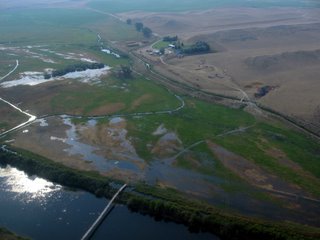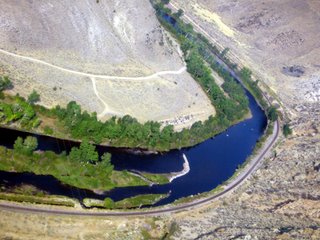
The Big Hole Watershed Committee began in 1995 as a group of diverse stakeholders that wanted to: (1) Address the problem of the Big Hole River being chronically dewatered; (2) Address the problem of the Big Hole River grayling going extinct.
Though it appeared that some progress was being made, the past few years have seen a halt or maybe even regression in reaching these goals.
 [photo at left: diversion dam near Maiden Rock; note that the irrigation ditch is in the LOWER left portion of the photo, and the river channel is in the UPPER left portion of the photo.]
[photo at left: diversion dam near Maiden Rock; note that the irrigation ditch is in the LOWER left portion of the photo, and the river channel is in the UPPER left portion of the photo.]What are the causes for this?
1. The watershed committee was not so diverse as we deluded ourselves into thinking it was. Moderate groups such as the Montana Wildlife Federation were not given a place at the table. This made the omission of Other groups, such as the Center for Biological Diversity (which had driven the grayling issue by petitioning for Endangered Species listing) more grievous.
2. The watershed committee claims to speak for critical stakeholders who do not accept the act of ventriloquism. This became graphically evident in the spring of 2003 when prominent upper river basin irrigators mocked the watershed committee's efforts at drought management, stating "You'll get our water when you pay for it;" and "We hope you succeed in getting other irrigators to let water go by their headgate, because we will take every drop of it."
3. The watershed committee is incapable of reining-in these and other irrigators--such as the downriver (from Maiden Rock to Twin Bridges) irrigators that seriously dewatered the river in summer 2006--in some cases with what proved to be illegal diversion dams.
4. The watershed committee regards stakeholders that speak out for their own interests as traitors. Guides and outfitters, conservation groups, and individuals--all commit treason if they refuse to be silenced, if they refuse to let the watershed committee speak on their behalf.
There is hope for the Big Hole Watershed Committee. But the watershed committee must learn to embrace and not silence diverse voices. Consensus and the alliances that support it can be challenged at any time. If the watershed committee continues to suppress or ignore criticism,* the group will simply become irrelevant. The number of dissidents is growing.
* By criticism, I mean actions as well as words. Actions speak louder than words: actions of irrigators who refuse to conserve water in a drought year; actions of irrigators that build illegal diversion dams; actions of irrigators that flood their fields with water while the river is closed to angling.

No comments:
Post a Comment